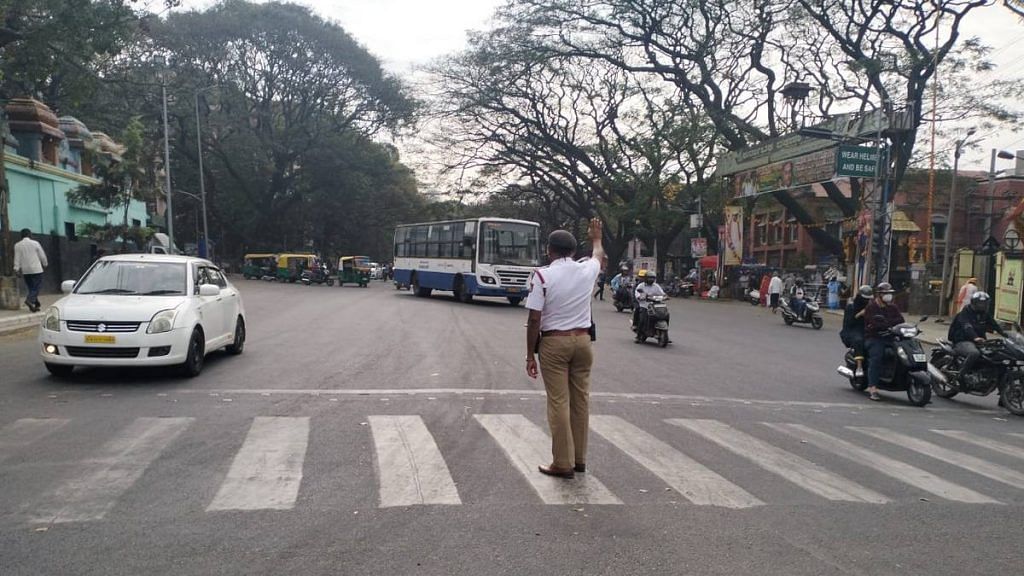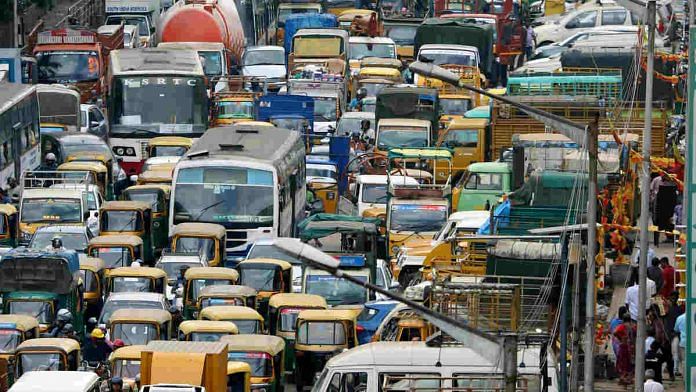Bengaluru: Buying a car seems easier than finding a parking space for it in Bengaluru, where there are nearly as many vehicles as there are people. Last year alone, the city’s police registered almost 15 lakh parking violations, a sign of just how rampant the problem is.
With an assembly election coming up this year in Karnataka, the Basavaraj Bommai-led Bharatiya Janata Party (BJP) government has tasked the traffic police with easing congestion in the city and to help salvage ‘Brand Bengaluru’, which has been significantly tarnished by crumbling infrastructure, pothole-ridden roads, the floods last year, and declining quality of life. The city contains 28 assembly seats out of a total of 224 in the state.
Bengaluru’s approximately 800 square kilometres are tightly packed, to say the least.
As of December last year, the IT capital was home to more than 1.3 crore people and over 1 crore vehicles. With parking and road infrastructure not keeping pace, jams and traffic-related issues plague the city.
The city’s 2020 Parking Policy 2.0, formulated by the Department of Urban Land Transport (DULT), is yet to be implemented, officials said. “The process has certainly been initiated. But the effort that should have happened, hasn’t,” said a senior official from the city’s civic body, Bruhat Bengaluru Mahanagara Palike (BBMP), on condition of anonymity.
Some changes, though, are afoot. Last November, the state government appointed IPS officer M.A. Saleem as the special commissioner of police (traffic) to help solve the city’s image-denting traffic issues on priority. He’s armed with no less than a PhD in traffic management and has even written a book on the subject.
Speaking to ThePrint, Saleem said he has been trying to streamline traffic in the city over the past three months, and there have been promising results in some junctions. Under his directions, traffic police have been asked to prioritise traffic management and to cut down on random stops for document-checking, which was contributing to congestion.
However, the city’s parking woes run deep, exacerbated by delays in policy implementation and a post-pandemic spike in the number of private vehicles.
Also read: Scandals, ‘vested interests’: How BJP’s awkward squad could trip up party in Karnataka poll race
Policy mostly on paper, ‘corruption’
Last year saw an alarming pile-up of parking-related violations in Bengaluru. Special CP Saleem said there were 15 lakh violations in all, including cases of parking on footpaths, bus stops, intersections, and so on. Parking violations came second only to helmet-related infractions (70 lakh).
The BBMP, which has been without an elected council since September 2020, has identified around 86 car parks, but is yet to implement the policy, adding to the chaos on the roads and along curbs.
“Under the comprehensive parking policy, places have been identified where paid parking is slotted, but this is not happening,” Saleem said. “Only Smart and TenderSURE roads have paid parking. Other than that, there is no paid parking.”

Bengaluru’s TenderSURE (Specifications for Urban Road Execution) roads are those that have been redeveloped and improved, with features such as broader pavements and better drainage. Smart roads, on the other hand, are equipped with technology including smart traffic lights, licence plate recognition cameras, and so on.
The policy also envisions reducing demand for private vehicles by getting more people to adopt sustainable mobility and non-motorised transport (NMT) so that “land allocated for parking can be reclaimed and put for more productive use”. But this seems to be a long way off.
On the NMT front, cycling lanes are rarely used — or can’t be used because they’ve been dug up — and walking on pavements has become treacherous. Further, public transport is in shambles. The Bengaluru metro has been caught up in delays, the suburban rail network is nowhere near completion, and the number of public buses has stagnated.
Government agencies, experts say, are trying to retrofit cycling lanes and other NMT options. Parking contracts are also a booming business, and allegedly awarded only to those with ‘political connections’.
For instance, the Brigade Shops and Establishments Association, which represents business owners on Brigade Road — one of the city’s biggest commercial stretches — had taken over the management of parking on the street between 2004 and 2019. But this was taken back as officials and others continued to demand bribes, shop owners reportedly claimed.
Meanwhile, the pandemic has resulted in more people owning private vehicles, adding to the pressure on the existing roads.
Over the past decade, the number of vehicles in Bengaluru has almost doubled from 50.33 lakh in 2011-12 to 1.04 crore till March 2022. Of the total vehicles registered in the city, there are more than 69.31 lakh two-wheelers and 21.97 lakh cars.
According to the city traffic police department, two-wheelers account for 70 per cent of all vehicles, 15 per cent are cars, 4 per cent are auto rickshaws, and the remaining are buses, vans and tempos.
A need to carve out parking spaces
Parking has become a highly contentious issue in residential areas. Several homeowners put up ‘no parking’ boards outside their homes even though they have no legal authority when it comes to roadside parking.
A family of three was allegedly attacked by a resident and his driver in the Jayanagar neighbourhood in December last year. There have been similar incidents reported in other parts of the city, too.
The Bengaluru city police have banned parking on all arterial roads — such as Old Madras Road, Ballari Road, and Tumakuru Road — that connect the city to other districts or commercial centres. But other options are limited, especially since there are just three multi-storey car parks in the city.
Saleem’s 2019 book, Traffic Management in Metropolitan Cities, points to the urgent need for more such complexes.
“Multi-level parking complexes should be a mandatory requirement in city centres that have several high-rise commercial complexes,” he writes. “If this is not taken seriously in the coming years, a lot of problems will pop up.”
(Edited by Asavari Singh)
Also read: Bangalore today is like a shy kid forced to be an extrovert



